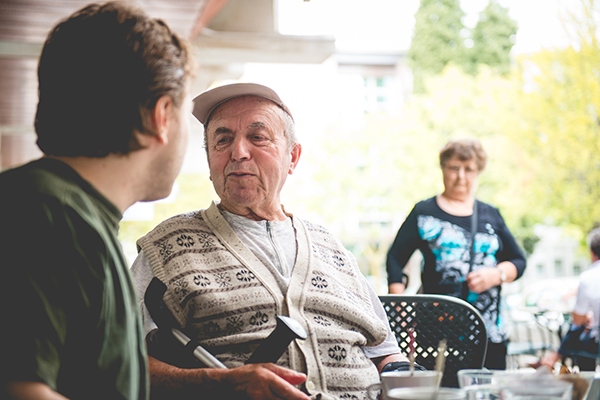Elevating the Role of Unpaid Caregivers
Unpaid caregivers, typically friends or family, provide essential care to people who are serious ill or dying—care that has an economic value of hundreds of billions of dollars a year. Yet as a society we don’t take their role seriously enough, or celebrate their incredibly meaningful work, says wellness expert and entrepreneur Alexandra Drane.
Drane underscored that message Dec. 6 at the End Well Symposium in San Francisco, joining a diverse group of thought leaders from across the country presenting ideas on how to improve the end-of-life experience in America. She is co-founder and CEO of Rebel Health and Archangels, an organization focused on connecting unpaid caregivers with local resources and bringing greater recognition to the work they do.
That goal hasn’t been without its challenges: namely identifying and reaching unpaid caregivers where they are, to get them the support they need. Solutions have required some out-of-the-box thinking.
Reaching Caregivers Where They Are
“We knew we had to support America’s 40 million caregivers, but our efforts to connect them with resources…failed,” Drane said. To learn more about how to engage the caregivers she was trying to reach, she took a job in 2016 as a part-time cashier at a Walmart in North Reading, Mass.
“It hit me—retail is the frontline of healthcare,” Drane said. Caregivers don’t have the time or luxury to engage with the healthcare system until it’s too late, but they do need to shop, “so let’s bring what we have to people while they are shopping.”
That approach, now being tested in stores in Massachusetts and Florida, is to place advocates wearing angel’s wings in stores to meet, acknowledge and thank caregivers for the work they do and to hand them a sheet listing resources that might help, including a toll-free phone number. The wings are the conversation starter.
“Maybe what we’re talking about is not just celebrating the caregiver but celebrating the act of caregiving,” Drane told the End Well audience.

Talking to Those You Love About Caregiving
When caregivers receive acknowledgement for what they do, it builds a powerful sense of purpose. But doing that without also acknowledging the person being cared for can create discord, Drane said. People with serious or life-limiting illness feel a lot of shame for needing help, and their caregivers experience isolation.
Ultimately, she said, society needs to embrace the caregiver’s role as something truly worth celebrating. People would pick who they want to be their caregiver and ask them in advance—with all of the intentionality of asking someone to marry them or to be the godparent to their children.
Ask them, “Will you be by my side as I age? Will you care for me, hold my hand, and let me hold yours?” Drane said. “This needs to be about relationship—holding one another up with authenticity and vulnerability.”
Caregiving conversations dovetail with advance care planning, which helps people identify and document what kind of care they want—or don’t want—in the event they’re unable to communicate their treatment wishes. Drane is also co-founder of Engage with Grace, which has developed a “One Slide Project” that encourages people to ask themselves five basic questions about the intensity of medical care they would want to receive, then share their answers with loved ones.




